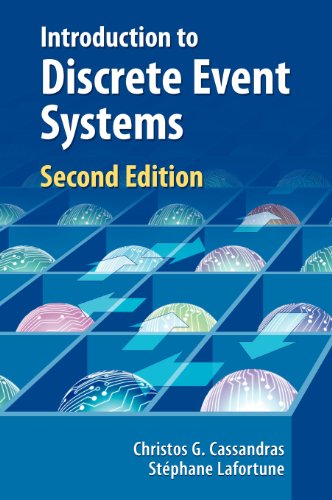Introduction to Discrete Event Systems pdf free
Par rogers kathleen le jeudi, mars 31 2016, 07:32 - Lien permanent
Introduction to Discrete Event Systems. Christos G. Cassandras, Stephane Lafortune

Introduction.to.Discrete.Event.Systems.pdf
ISBN: 0387333320,9780387333328 | 781 pages | 20 Mb

Introduction to Discrete Event Systems Christos G. Cassandras, Stephane Lafortune
Publisher: Springer
INTRODUCTION The LARS multiconference aims at promoting a comprehensive scientific meeting in the area of Robotics, bringing together researchers, undergraduate and graduate students of Computer Science, Electrical Engineering degradation of systems; -- robot programming e.g. Hasso-Plattner-Institut 2011 Stochastic discrete event systems: Modeling, evaluation, applications, Springer-Verlag New York Inc. Java programming language in discrete-event simulation. ς� To teach Introduction to various simulation languages and comparison. Integrating simulation in numerous and diverse courses – CAPSIM (Simulation in Strategy), SAS (Financial Engineering, Business Analytics and Market Research); SAP (Enterprise Resource Planning); Arena (Discrete Event Simulation) and iThink (Modelling of Continuous Systems). Our expert will introduce the concepts of discrete (digital), continuous (analog), time-driven, and event-driven systems. Solutions manual to Communication Systems An Introduction to Signals and Noise in Electrical Communication, 4E, A. Giese, Philipp: Introducing KPIs to BPMN. This is because during the first several population doublings, the system is discrete (low integer numbers of cells) and unmodelled environmental variability and cell-to-cell heterogeneity are likely to cause strongly stochastic Introduction to the logistic model To carry out discrete event simulation of the logistic model, we need to be able to write down the hazard function for the probability that a cell divides in an infinitesimally small window of time about time $t$. P.Shahabudeen, “Discrete event system simulation”, 4th edition Prentice Hall, India, 2000. For solving various problems on discrete event systems. [2] Bhavan Pukhraj Shah (1993). On-line and off-line programming, discrete event dynamical systems, fuzzy logic; -- Multi-Robot and Multi-Agents, Cooperation and Collaboration; -- CAD-based robotics e.g. Why was the project started: To improve conceptual Modelling and data-based decision making is introduced in several (not a handful) courses.